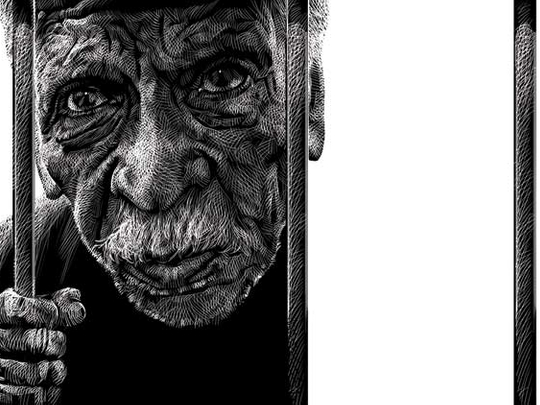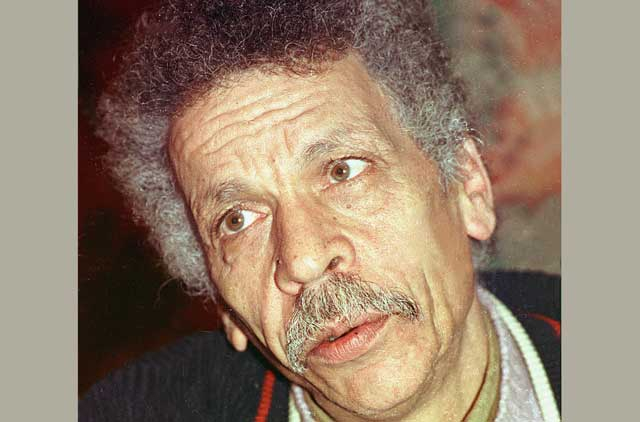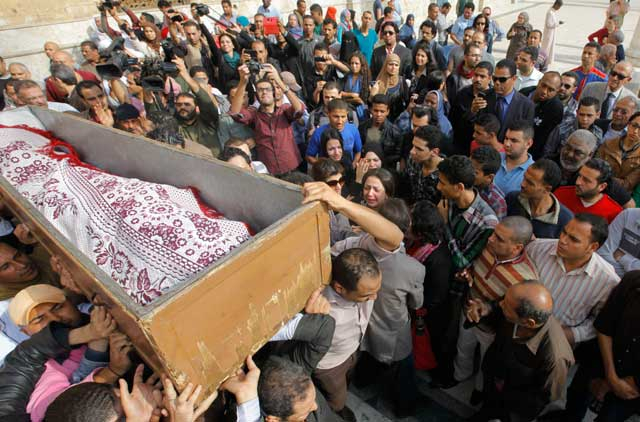
“I still write like I’m 25, eat like I’m 25, and please a woman like I’m 25.”
Ahmad Fouad Najm was 83 when he uttered those words last year. He died in Cairo on Tuesday.
Hundreds attended his funeral after prayers at Al Hussain mosque near the Khan Al Khalili bazzar. They paid last respects and offered prayers for a man who was the consummate poet of the people, He captured their hopes and dreams in words and lyrics that fuelled generations of ordinary Egyptians.
Three years ago, when hundreds of thousands took to the streets of Cairo to demand the end almost three decades of rule by then President Hosni Mubarak, they sang the songs and chanted the verses of Najm, a poet whose very words were deemed so dangerous that he spent 19 years behind bars.
The Brave Man is Brave resounded almost hourly off the buildings and barricades that lined Tahrir Square as protesters fought off Mubarak’s security forces in the final days of his regime. It was such words that led to Nejm’s imprisonment by presidents Gamal Nasser and Anwar Sadat — they and Mubarak threatened by stanzas of a man who was born to illiterate parents and whose CV included stints as a shepherd, labourer, house servant, postman, felon, forger of documents and a musician.
But above all, he was a writer who pricked the very conscience of the Egyptian people, seeing subversion where poor went unpaid, homeless squatted in squalor, and rich held its grip on power through corruption and uncaring government officialdom.
Najm’s view of life came from his cramped and chaotic Cairo rooftop apartment — two plaster-peeled rooms overlooking rooftop water tanks, wires, drying laundry, satellite dishes and the human detritus that scratches out a filthy living in the Mokkatam neighbourhood of Cairo. This is just one of many such neighbourhoods where poverty in endemic and the average wage is just Dh50 a day — if you can find work.
From these infested streets, the poetry of classical Arabic is out of place, instead Nejm penned the guttural vernacular of the streets, giving voice to social sentiment and a biting political commentary on the drudgery of life and the struggle to makes ends at least line up if never meet.
His death at 84 was confirmed by his publisher, Mohammad Hashem. He said his last call with Nejm was on Monday morning, Nejm seemed fine but his voice was “a little heavy.” Nejm was a life-long smoker Merit Ultra Lights and other non-legal, non-tobacco substances.
Born in 1929 and one of 17 children — five of whom survived the poverty of Sharqiya — he worked as labourer after leaving the village ‘kuttaab’ school — where learning the Quran was all that mattered. He found work at a British military camp. While working with authorities by day, at night he and fellow guerilla plotted their downfall.
His first spell in jail came from wrongful conviction, set up by corrupt officials who stole equipment from a workshop.
In prison, he found time to put thought and anger to paper, publishing Images From Life In Prison in 1959 to limited critical acclaim.
It was his early years of social injustice, hardship and an unjust legal system that fuelled his life-long conflict with authority, government and the powers that be. That Egypt failed during the Six Day War in 1967 gave Najm a popular platform to denounce Cairo.
He saved special derision for Sadat, mocking his televison appearences and spending 11 years in jail for doing so.
“The government has always been run by pharaohs,” Najm told Al Jazeera in an interview. “But at least they were honourable. Now, Egypt is ruled by a gang, led by Hosni Mubarak, and he is only there because America and Israel support him. He does not have the support of the street.”
He loved to joke, to wink, to smile — and to love. He married six times and his widow, Sonio Mikio is 31, his youngest child, Zeinab just turned 12.
Whiie his poems hit hard, his life-long friendship and musical collaborations with the blind traditional singer Shaikh Imam Essa gave a drum beat to a satirical repertoire that undermined Egypt’s successive leaderships.
When a donkey brayed in the streets below, Nejm quipped: “Mubarak is giving a speech.”
Yesterday, this poet and observed of life was finally silenced.
“His death is a big shock,” Hamdeen Sabahi, a former presidential contender, said. “Najm was the bold voice of the people. Our consolation is that his works will always be there to inspire the nation in every critical stage,”
Khalid Ali, a leftist former presidential candidate, noted: “Ahmad Fouad Najm repeatedly paid the price for what he believed in. He strongly fought against injustice and corruption. He continued to struggle until the last day in his life,”
And for Najm’s granddaughter, Aya, there was this: “My grandpa did not suffer from any disease. He died suddenly and peacefully.”
Najm words will live on.













